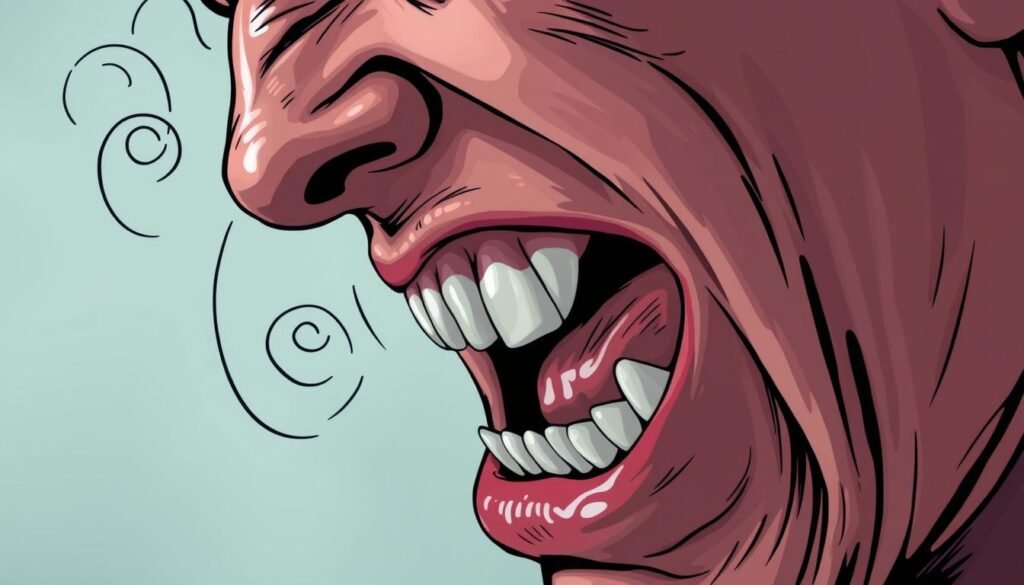About 40 million American adults face anxiety disorders. Symptoms like lower jaw trembling show up often. This trembling can be an automatic response to stress, showing more serious problems. It’s key to understand why this happens and how to deal with it. We’ll look into how anxiety links to muscle tension, the problem with jaw clenching, and ways to ease the pain.
Key Takeaways
- Lower jaw trembling anxiety is a common symptom for many with anxiety disorders.
- Muscle tension makes anxiety tremors worse, causing more discomfort and stress.
- Relaxation methods and mindful exercises can help with jaw tension.
- Seeking professional help can provide lasting relief from anxiety.
- Natural remedies may also help in managing anxiety better.
Understanding Lower Jaw Trembling Anxiety
Lower jaw trembling anxiety often shows as involuntary jaw muscle spasms. These cause visible shaking or trembling; it’s tied to anxiety disorders. This happens because stress leads to physical symptoms. Understanding this, we see anxiety turns into muscle tension and jaw discomfort. This condition can greatly affect those who have it.
Defining Lower Jaw Trembling Anxiety
Lower jaw trembling anxiety is when anxiety causes jaw tension. In 2020, research on 113 dental students showed a link between anxiety and muscle tension. Those with more anxiety had more masseter muscle tension. It happens during stress or anticipation, causing discomfort.
People with anxiety might clench their jaws, grind their teeth, or bite objects. A 2022 review showed muscle tension is common in anxious individuals. Thus, overcoming this requires therapy, mindfulness, and behavioral changes. It’s a holistic approach.
| Study Year | Participants | Findings |
|---|---|---|
| 2020 | 113 dental students | Higher self-reported anxiety levels linked to increased masseter muscle tension. |
| 2021 | 537 individuals | Documented jaw tension symptoms including clenching and grinding. |
| 2022 | N/A | Identified cognitive and physical symptoms of anxiety disorders, including muscle tension. |
Understanding the connection between lower jaw trembling and anxiety is key. The right management and relief strategies are crucial. They include psychotherapy, behavior changes, and stress relief activities. These strategies can help effectively.
Causes of Lower Jaw Trembling Anxiety
The reasons behind lower jaw trembling due to anxiety are quite layered. Emotional stress plays a big part. People with anxiety often have tighter muscles. A study showed that people with more anxiety had tenser jaw muscles.
There are several reasons for this:
- High Stress Levels: Too much stress can make muscles twitch, causing shakes.
- Chronic Anxiety Disorders: Generalized anxiety disorder and panic disorder can make stress-related tremors more common.
- Genetic Predisposition: Having family members with anxiety might make you more likely to experience it too.
- Environmental Stressors: Stress from work or relationships can make anxiety worse.
- Chronic Stress: Being stressed for a long time can cause your body to react, including your jaw.
To deal with lower jaw trembling from anxiety, it’s key to understand these causes. Looking at both mental and environmental factors can help those affected find relief.
| Factor | Description |
|---|---|
| High Stress Levels | Long-term stress can cause jaw muscles to react without control. |
| Anxiety Disorders | Conditions like generalized anxiety disorder increase muscle tension. |
| Genetic Factors | A family history of anxiety might make you more susceptible to symptoms. |
| Environmental Stressors | Demands from work or personal life can increase anxiety levels. |
| Chronic Stress | Constant stress can show physically, like jaw trembling. |
Link Between Anxiety and Muscle Tension
Anxiety affects our physical health, especially through muscle tension. This often shows up as muscle spasms. Stress hormones cause the body’s “fight or flight” response. This makes muscles, like those in the jaw, tense up. As anxiety grows, feelings like shaking or spasms become more common.
When anxiety leads to muscle tension, it starts a cycle. Discomfort from this tension makes anxiety worse. This cycle can make symptoms like jaw tension from stress more intense. People might grind their teeth without meaning to. This can make muscle spasms worse and add stress to sore muscles.
Several things can make anxiety and muscle tension worse. Not sleeping enough can lead to more muscle movements that you can’t control. Drinking caffeine can make you more likely to have spasms. Not getting enough calcium or magnesium can harm the nervous system, making anxiety and muscle twitches worse. Not drinking enough water also makes these symptoms worse.
| Factor | Impact on Muscle Tension |
|---|---|
| Lack of Sleep | Increases involuntary muscle movements |
| Caffeine Intake | Heightens susceptibility to muscle spasms |
| Nutritional Deficiencies | Impairs nervous system, induces muscle twitches |
| Dehydration | Worsens muscle twitching |
| Hormonal Changes | Triggers muscle twitching perceived as stress |
Understanding the link between anxiety and muscle tension is key. It helps people take steps to manage their anxiety. Good management can break the cycle of tension and anxiety. This leads to better health, both physically and mentally.
The Role of Jaw Clenching and Teeth Grinding
Jaw clenching and teeth grinding often happen because of stress and anxiety. These behaviors can cause a lot of discomfort. They affect your dental health and overall well-being. High anxiety levels and these habits are connected, showing a strong link.
Teeth grinding is more common in young people. About 50% of kids grind their teeth at night. Around 15% of teens do too. As people get older, the numbers drop to 8% of middle-aged adults and 3% of older adults.
Genes might make you more likely to grind your teeth, as it runs in families. Some medications, like SSRIs and antipsychotics, can also increase the risk. Knowing about anxiety and other risks is crucial to avoid more jaw clenching.
To manage these habits, keep an eye on what triggers them. Use relaxation techniques, maintain good sleep habits, and visit the dentist regularly. Spotting the signs early is key to dealing with the anxiety that causes these issues.

| Age Group | Prevalence of Bruxism | Common Risk Factors |
|---|---|---|
| Children | Up to 50% | Stress, dental growth |
| Adolescents | About 15% | Stress, genetics |
| Middle-aged Adults | 8% | Anxiety symptoms, medication use |
| Older Adults | 3% | Stress, sleep disorders |
Symptoms Associated with Lower Jaw Trembling Anxiety
Many people are dealing with lower jaw trembling due to anxiety. This condition affects both the mind and body. You might see your lower jaw shake or feel muscle spasms.
People often have tight jaw muscles and trouble moving their mouths. This makes it hard to talk or eat comfortably.
Other symptoms include headaches and pain around the face. Some also hear clicking sounds when moving their jaws. This makes things even harder.
Worrying too much about the trembling can lead to avoiding friends. It’s tough to focus and easy to feel upset. This makes the anxiety even worse.
Panic attacks can happen too. When they do, your heart beats fast, and breathing speeds up. You may feel really scared or even dizzy.
Knowing these symptoms helps in getting the right help. It’s important to seek advice from doctors or therapists. They can suggest ways to manage these feelings.
| Physical Symptoms | Psychological Symptoms |
|---|---|
| Visible trembling of the jaw | Increased anxiety about trembling |
| Muscle spasms | Avoidance of social situations |
| Jaw muscle tension | Difficulty concentrating |
| Clicking sounds in the jaw joint | Feelings of frustration |
| Headaches or facial pain | Panic attack signs |
Learning about these symptoms is the first step to better health. Getting professional advice and using the right coping methods can improve your life.
Psychosomatic Jaw Tension: What to Know
Psychosomatic jaw tension shows how our thoughts affect our body. It shows when stress makes our bodies react. This can cause discomfort.
People with this tension might feel their jaw tighten or shake due to stress. Studies show easing anxiety helps lessen this tension. It makes us feel better overall.
Knowing it’s psychosomatic helps us find ways to treat it. This can include
mindfulness practices, breathing methods, and exercises. They help relax muscles and reduce stress.
Early action against this tension improves comfort and mental focus. It helps strengthen the connection between mind and body.

Impact of Stress on Facial Muscle Spasms
Stress greatly affects our facial muscles. It often leads to problems like muscle spasms in the face. Especially in those under a lot of stress for a long time. These spasms can appear as uncontrollable twitching, mainly in the jaw area. For many, this condition causes a lot of discomfort and increases anxiety.
People in high-stress jobs or caring for sick loved ones may get facial twitching. Over time, this might turn into a serious condition known as hemifacial spasm. Techniques for managing stress, such as meditation and yoga, can really help. They make your mind and body calmer, providing jaw tension relief. You can find more info on these methods here.
Adding deep breathing and yoga to your daily life helps with muscle spasms caused by stress. These methods decrease cortisol, the stress hormone, and help you relax. Knowing how stress affects your face muscles is key. It shows why we need to handle anxiety better.
| Stress Management Technique | Benefits | Impact on Facial Muscle Spasms |
|---|---|---|
| Deep Breathing | Reduces cortisol levels | Can alleviate tension in facial muscles |
| Meditation | Promotes mental calmness | Helps in managing stress and anxiety |
| Yoga | Improves overall well-being | Assists in reducing jaw tension |
Understanding stress and facial spasms is crucial. By adopting stress management practices, we can lessen symptoms. This highlights the need to focus on mental health for our physical well-being.
Behavioral Modifications to Manage Anxiety Tremors
Managing lower jaw trembling from anxiety requires effective behavioral changes. These can help people handle their symptoms better. Having the right tongue and lip position helps relax, reducing tremors. It’s also key to cut down on caffeine, as it can make anxiety worse.
Mindfulness like yoga and deep breathing is essential for dealing with anxiety. They ground a person, helping order their thoughts. Cognitive Behavioral Therapy (CBT) is also crucial. It changes negative thinking, giving people more control over their anxiety and its effects.
Living a healthy life is just as critical. Getting enough sleep, exercising, and eating right can greatly lower anxiety. Below is a table showing lifestyle changes that help manage anxiety and its symptoms:
| Lifestyle Adjustment | Benefit |
|---|---|
| Regular Exercise | Reduces stress hormones and increases endorphins |
| Healthy Eating | Supports overall brain function and mood |
| Adequate Sleep | Restores body function and improves tension management |
| Mindfulness Meditation | Enhances emotional regulation and reduces anxiety |
These steps offer a complete way to fight anxiety and tremors. They tackle both the mental and physical sides. Combining therapy with these lifestyle changes can help people cope better and for longer.
For more info on managing anxiety, check out this resource.
Effective Exercises to Relieve Jaw Tension
Getting rid of jaw tension can make you feel better emotionally and overall. Adding exercises to your daily habits helps ease the tension. It brings down anxiety by boosting relaxation.
- Relaxed Jaw Stretch: Open your mouth slowly, hold for 5 breaths. Do this 10 times.
- Resistance Mouth Opening: Put a hand under your chin. Gently press while opening your mouth. Hold for 5 breaths and repeat 10 times.
Make these stretches last at least 2 minutes for the best results. Slow, deep breaths help you stay calm while moving. Be gentle and stop if it hurts.
Try these exercises twice daily, especially in the beginning weeks. Spending 15 minutes on these can ease your jaw tension. They focus on various muscles, including your neck and shoulders, to reduce tension.
Incorporating progressive muscle relaxation adds more value. It’s good to pay attention to different muscles like in your stomach, chest, and face. This helps with relaxation and feeling better overall.
To help, there’s a Tense & Release Audio that guides you through these exercises. Using it regularly makes the techniques even more effective.
For other ways to handle anxiety and its effects, look into more relaxation strategies. Consistent practice and mindful breathing bring lasting benefits for easing jaw tension and boosting emotional health.
| Exercise | Repetitions | Breaths | Duration |
|---|---|---|---|
| Relaxed Jaw Stretch | 10 | 5 per stretch | 2 minutes |
| Resistance Mouth Opening | 10 | 5 per stretch | 2 minutes |
Professional Treatment Options for Lower Jaw Trembling Anxiety
Lower jaw trembling anxiety can disrupt daily life. Getting professional help is crucial for dealing with it. Treatments like psychotherapy, medications, and physical therapy provide great relief.
CBT is effective in tackling anxiety. It involves changing the way we think about stress. Relaxation techniques, such as deep breathing and yoga, also help lessen anxiety symptoms.

Medications like SSRIs address both the mind and body aspects of anxiety. It’s important to work with healthcare professionals to customize these treatments. Recognizing what triggers your anxiety and finding ways to cope with stress is key.
Professional treatments include:
- Customized mouthguards to protect against tooth damage and muscle tension.
- Physical therapy aimed at reducing muscle tightness and improving mobility.
- Diagnostic assessment for underlying issues, such as TMJ nerve damage.
Seeking professional help can greatly improve your ability to handle anxiety. Accessing the right support provides the tools needed to effectively manage anxiety.
| Treatment Option | Description | Benefits |
|---|---|---|
| Cognitive-Behavioral Therapy (CBT) | A structured approach that helps identify and change negative thought patterns. | Reduces anxiety and improves coping mechanisms. |
| Medications (SSRIs) | Pharmaceuticals used to treat anxiety and depression. | Helps balance mood and reduce anxiety symptoms. |
| Mouthguards | Custom appliances designed to protect teeth during clenching. | Reduces muscle strain and prevents dental damage. |
| Physical Therapy | Therapeutic interventions targeting jaw and neck relaxation. | Enhances mobility and alleviates tension. |
Holistic Approaches to Address Anxiety Symptoms
Embracing holistic approaches can help greatly with anxiety symptoms. These methods combine traditional therapy with practices that boost well-being. Techniques like yoga, meditation, and mindfulness exercises aim to calm the mind and body. Research shows that mindfulness can improve anxiety in just eight weeks. This is a big plus for mental health.
Adding breathing exercises is also effective. Diaphragmatic breathing, box breathing, and 4-7-8 breathing are good techniques. They help control your breathing and ease anxiety symptoms. The shaking from anxiety often comes from the “fight or flight” response. Relaxation methods, like progressive muscle relaxation or body scans, can reduce this shaking significantly.
Nutrition is key in holistic care. Foods high in omega-3 fatty acids are great for mental health and well-being. Combining nutrition with therapies like biofeedback and cognitive behavioral therapy (CBT) offers an all-around approach to anxiety.
Overall, a holistic strategy doesn’t just manage anxiety. It also helps individuals build resilience. This all-in-one approach helps people not just survive anxiety but thrive in daily life.
Conclusion
Knowing about lower jaw trembling from anxiety is key for those dealing with it. This guide covers the causes, symptoms, and treatment options. It shows the connection between anxiety and muscle tension. It also highlights how things like cognitive therapy, relaxation, and changing your lifestyle can help.
For those with symptoms like teeth chattering, it’s important to know what triggers them. Using mindfulness and talking about feelings can really help with these symptoms. Also, getting help from a professional is vital for serious or ongoing anxiety.
Learning about this anxiety lets people find the best ways to improve their lives. They can use behavior changes, natural treatments, and expert advice to lessen their anxiety symptoms. Handling anxiety well makes life better and eases tough physical feelings.